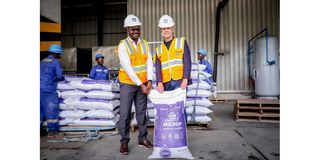Strategies Africa needs to fill empty stomachs

Yara International President and CEO Svein Tore Holsether flanked by Yara Tanzania MD Winstone Odhiambo display a bag of Tanzania made MiCROP fertilizer
Dar es Salaam. Africa needs increased investments, good agricultural practices and the application of appropriate technologies to boost food production, experts have said.
This emerged as a high profile conference on how to transform the food systems in the continent got underway in Dar es Salaam yesterday with pre-forum sessions.
AGRF or Africa Food Systems Forum 2023 will attract leaders from various countries who will deliberate on how to fill millions of empty stomachs in the continent.
However, the continent is also in dire need of relevant policies, access to finance especially for smallholder farmers to buy the inputs as well as youth and women empowerment.
The Julius Nyerere International Convention Centre (JNICC) in the heart of the country's commercial hub was a hive of activity yesterday in readiness to the event.
"AGRF will this time be rather different from the past fora. On Tuesday alone, there will be 40 parallel sessions,” said Zamaradi Kawawa, a senior official of the Information ministry.
Topics to be discussed will range from agricultural, livestock and fisheries production, the latter within the framework of Blue Economy to agricultural finance and research.
Policy makers, agricultural economists, innovators and extension experts from various agricultural firms and NGOs reached out by The Citizen insisted that the forum must come up with workable interventions to end the food woes
Today's sessions will be graced with the launch of the Africa Agriculture Status Report (AASR) which is expected to shed light on the level of gains made and failures in food production.
The critical role of data and research in driving innovation and progress in the agricultural sector and food systems value chains will also be in the limelight.
According to Ms Kawawa, the presidential segment of the Forum will begin on Thursday when various heads of state will join President Samia Suluhu Hassan at JNICC.
Climate change, a phenomenon associated with global warming, and which is blamed for the food crisis facing the continent will come in large during discussions.
Experts and policy makers will explore innovative policies, practices and technologies that promote climate-resilient agriculture.
Such interventions are deemed to enhance adaptation and mitigation strategies as well as ensuring food security in the face of unfavourable climatic conditions.
African countries account for only around percent of the global emissions responsible for climate change, but suffer more than any other region from its impact.
Of the 20 nations ranked as most vulnerable to climate change, all but four are African, according to the Notre Dame Global Adaptation Index, which measures countries’ vulnerability.
Conflict has long been a driver of hunger. War forces civilians from their homes, livelihoods, farms and food sources. It also makes it dangerous to deliver assistance.
The number of displaced people in Africa has tripled over the past decade to a record 36 million in 2022, according to the United Nations data.
That represents almost half the displaced people in the world. Most were displaced internally within their own countries by conflict.
A programme issued by the organizers - the Tanzania government and a host multilateral agencies - said the four day forum will explore the latest breakthroughs and best practices in food systems transformation.
Emphasis will be laid on Africa's food systems advancement in terms of availability, affordability, accessibility and sustainability.




